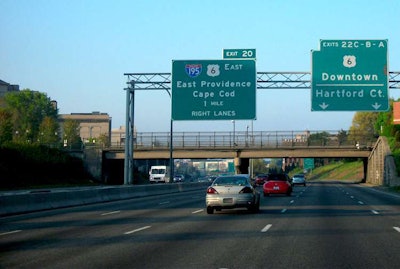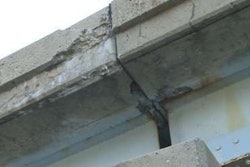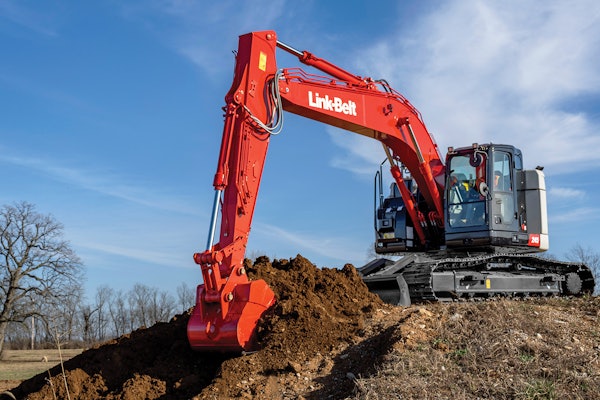
Rhode Island Gov. Gina Raimondo is proposing a long-term budget amendment that would increase spending on roads, bridges, and mass transit projects by $1.1 billion over the next 9 years.
The proposal, titled RhodeWorks, would increase the Rhode Island Department of Transportation’s infrastructure investment from $3.7 billion to $4.8 billion through 2024.
“While deteriorating roads and bridges is a problem nationwide, Rhode Island ranks last for the overall condition of our bridges,” Raimondo said at a press event announcing the proposal. “The longer we wait to address this problem the more expensive it will become to fix. Our RhodeWorks proposal will not only help keep Rhode Islanders safe, but it will also grow our economy, create jobs, save over $1 billion in projected future costs, and make the state a more attractive place for businesses to invest.”

One key objective is to improve the state’s bridges to a point that 90 percent are “structurally sufficient” by 2024. Currently, roughly 22 percent of the 1,162 bridges in Rhode Island are structurally deficient.
To provide bridge funding, the plan proposes a $700 million revenue bond, with $400 million used for bridge repairs on Routes 6 and 10 and the remaining $300 million to be used throughout the state. To pay off the bond, RhodeWorks would assess a fee on large commercial vehicles, primarily along bridges on six main routes (95, 195, 295, 6 and 10). These would be collected electronically without tollbooths, and would potentially raise $100 million per year.
No other vehicles, including cars, motorcycles, SUVs, pick-up trucks or small commercial vehicles, will be assessed the fee.
According to a report by Rhode Island Public Radio (RIPR), Raimondo said at the press conference the fee on commercial vehicles was well justified. “And the fact of the matter is, those are the trucks that cause 90 plus percent of the damage on our roads and bridges,” Raimondo said. “They’re also the ones that benefit most from high quality well-maintained roads, so to assess a modest user fee is a creative way of financing it.”
Rhode Island does not currently asses a user fee for commercial trucks, but most other states in the area, including Maine, New Hampshire, Massachusetts, New York, New Jersey, Pennsylvania, Delaware, and Maryland, charge user fees along the Interstate 95 corridor.
In the RIPR report, Rhode Island Trucking Association President Christopher Maxwell expressed his dissatisfaction with the proposed fee. “The governor mentioned 18-wheelers at her press conference,” Maxwell said in the report, “but this proposal greatly impacts all kinds of trucking including delivery trucks.
“Small business owners will be forced to pass increased costs onto their consumers, as they will have no other choice. To our knowledge, every other state that the governor cited in her press release that has tolls also includes passenger vehicles. This type of inequitable taxation will only hinder economic growth. We also are disappointed the governor has offered no specific tolling locations or costs associated with her proposal.”
American Trucking Association President and CEO Bill Graves said in a statement the association is “very disappointed” with the commercial vehicle fee proposal.
“Trucking did not create the state’s current infrastructure crisis—that was the result of years of mismanagement and massive diversion of fuel tax and other highway user fee revenue to fund general government expenses—and it is completely unfair that the industry be targeted to fix it,” he said.
“As a former governor, I understand the importance of not only properly funding infrastructure, but maintaining the state’s fiscal house,” Graves added. “However, this plan to toll only trucks is quite literally highway robbery—stealing from our industry to paper over Rhode Island’s budget issues.”
He went on to say the transportation funding issues in the state are due to revenue meant for highway projects being shifted to “non-transportation” work.
“Like nearly half the states have done previously, the state should enact a law that protects highway related revenues from being used for non-highway or transportation projects,” Graves said. “Then they will have an accurate sense of what, if any, funding shortfall really exists before embarking on some enormously expensive, inefficient, easy to evade and discriminatory form of tax scheme.”
To reach the $1.1 billion total, the plan also proposes to “seek to attract an additional $400 million in federal matching funds for public transit.”
RhodeWorks has the support of both chambers of the Rhode Island general assembly, with House Speaker Nicholas Mattiello and Senate President M. Teresa Paiva attending the press conference with Raimondo.
“Infrastructure is a critical component of rebuilding our economy and improving our job climate,” Mattiello said. “The proposal by Governor Raimondo is an investment in economic development, while getting people to work in the construction trades. Being ranked at the bottom of states with deficient bridges is a disincentive to businesses looking to locate in our state. The House Finance Committee will hold a public hearing and review the details carefully in the weeks ahead.”
Paiva said the senate was looking forward to examining the plan and its impact on the state’s business community. “It is vital to Rhode Island’s economic wellbeing that we invest in our transportation infrastructure,” she said. “The Governor’s bold action plan aims to put thousands of Rhode Island construction workers back on the job now, while ensuring that roads and bridges are in good repair well into the future.”
Summaries of the RhodeWorks plan are available here.











